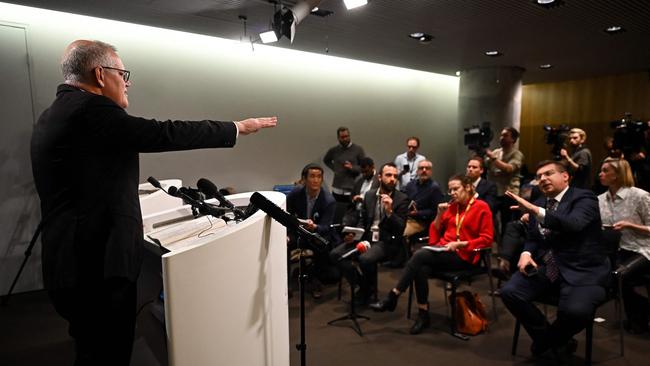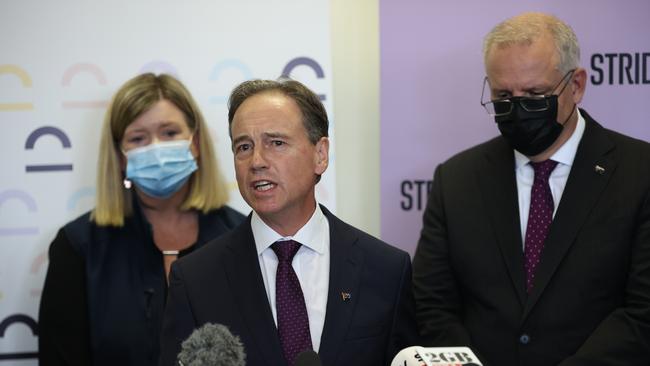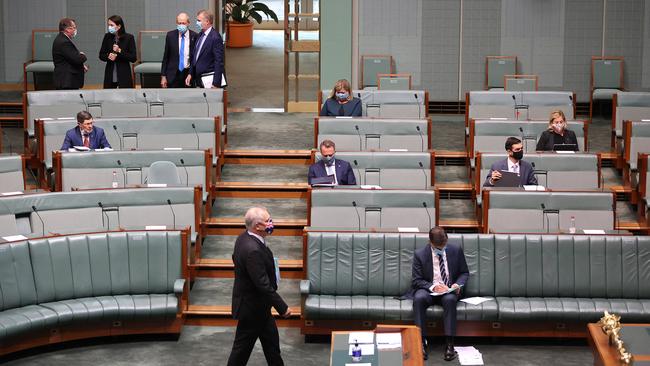The great Covid power heist
Morrison’s moves are inexcusable, but they are part of much larger disgrace.

Sure, it is galling to see Anthony Albanese – the Prime Minister no less – leading the hypocritically partisan attack on Morrison when he should have bigger fish to fry, such as running the country. But that does not mean this is a trifling matter.
Albanese’s duplicity stems from the way he never raised a word of dissent or criticism as mainly Labor state governments trashed human rights, personal liberty, due process, and democratic processes throughout the pandemic. Yet now, with Morrison in the frame, Albanese and Labor have suddenly rediscovered a penchant for transparency and accountability.
We should run a book on how long it lasts.
So, the question is that given it mainly did not alter government action, what was the harm in Morrison’s secret shadowing of his ministerial colleagues, other than to personally deceive them?
Some want to pass this off as a mere administrative blunder or personal slight.
It is far more substantial than either of those. His ruse undermined the core principles of cabinet government in a covert attempt to centralise power in the hands of a prime minister who seemingly thought of himself more like a president.
The current version of the Cabinet Handbook was signed off by Morrison in October 2020. It declares the “guiding principles” of cabinet as “collective responsibility and cabinet solidarity” which are the “binding devices” that ensure “unity of purpose” in government.
The Parliament House website also posts formal descriptions of government practice. “The approval of the Governor-General to the composition of the ministry, the creation of departments, the allocation of portfolios and any ministerial and departmental change is notified publicly and announced in the house,” it says, citing an esteemed, century-old legal text.
While there appears to be no specific law or rule prohibiting Morrison’s manoeuvre, none of the guidelines, nor 121 years of federal parliamentary experience, defined lines of accountability, or even common workplace respect for colleagues, allow for the prime minister to secretly have himself appointed to administer departments and hold the relevant powers of other ministers.
The expectation is that cabinet receives all relevant information and that all such arrangements are made public – we can expect an explicit rule on disclosure to be imposed from now on.
We are left to speculate about Morrison’s motivation. His interviews, statements and hour-long media conference did not help; well, at least not explicitly. The former prime minister contradicted himself with conflicting explanations for his secrecy. There was accidental oversight – “things were moving very quickly at the time, none of us are perfect”.
And there was a presumption ministers were told – “my honest recollection was that there had been a communication between officers in relation to the minister for finance”. There was also timeliness – “I didn’t consider it at the time, given everything else that was going on and the other priorities we were dealing with, that it was a matter that needed to be raised at that point, if I needed to use the powers then I would have disclosed them with the minister”.
But there was also the deliberate strategy – “I did not want any of my ministers to be going about their daily business any different to what they were doing before, I was concerned these issues could be misconstrued and misunderstood and undermine the confidence of the ministers in the performance of their duties”.
And then, perhaps best of all, there was innocence proffered to justify stealth, or simply put, ignorance is bliss – “the fact that ministers were unaware of these things is actually proof of my lack of interference or intervention”.
That is five different angles on why ministers were not told their prime minister had replicated their authority for himself. And not told them.
The suggestion these arrangements were needed in case ministers fell ill is disingenuous. Ministers routinely have other ministers act on their behalf when they are incapacitated or are replaced easily and quickly when they suddenly quit. There simply was no need for a standby super-minister hiding at Parliament House as the mild-mannered prime minister ready to spring into action.
Greg Hunt knew about this arrangement for his health portfolio right from the start. He was fully co-operative in a move that dissipated the enormous pandemic powers placed in his hands under the biosecurity act by having them rest also with the prime minister.
In effect, this tied them together in their decision-making. But that is how they should have been considering these matters anyway; and cabinet should have been told.
The conclusion we are invited to draw is that after taking this perhaps understandable action for health, Morrison was tempted, over time, to give himself a controlling role in other portfolios in case he needed to overrule his colleagues.

This is borne out by the way he assumed the resources minister’s powers to reject a project that he feared Keith Pitt was about to approve. Morrison held these duplicated powers secretly until he needed to reveal them and overrule a colleague.
This is quite the insult to Mathias Cormann, Josh Frydenberg, Angus Taylor and Karen Andrews. It is also quite the opposite to the concept of cabinet governance. This undermined transparency, accountability, and ministerial responsibility. It centralised power in the hands of one person in a way that cabinet government specifically was developed to avoid.
Not for a moment do I contend this was a deliberately subversive act by Morrison. This was a prime minister at a time of crisis noticing a chance to take more power, adding it to his political armoury, hiding it, and not stopping to consider the broader implications or the likely attitudes of this colleagues.
If this had been revealed a year ago, Morrison would have been toppled. And now his most bitter enemies will use it to confirm their long-standing slights about arrogance and deception.
The former prime minister will have to deal with those ramifications. There should be no push for him to resign from parliament, but this will mean his presence on the backbench is more of a burden for Peter Dutton.
Labor will try to extend the controversy, making it difficult for Morrison to establish the legacy he deserves and prepare to leave politics on his terms. It will be a drag on Dutton’s efforts to forge ahead.
Yet these matters of mere politicking should not distract from the core lesson. Surely Morrison’s misjudgment has proven even to the most interventionist leftists and the most loyal supporters of the Coalition government that, along with respiratory systems, the coronavirus from Wuhan also assaulted good governance.

Morrison described confronting the “raging tempest” of the pandemic to justify his unwise actions. But it was the panic and over-reaction, evident early on, that led to far greater transgressions across the country, especially by state governments.
From before we imposed our first lockdowns, it was clear this disease was only a modest threat, or less, to the vast majority. It was clear we needed to focus on protecting the vulnerable, who were clearly identified as the elderly and the severely ill.
Yet we closed businesses, stopped Australians coming home, banned them from leaving, closed state borders, kept children from school, separated families, crippled cities, arrested people in the park, banned them from beaches, mandated masks, mandated vaccines, blocked people from funerals, kept them from hospitals and stopped social contact. We paid for this madness by surrendering decades of fiscal repair, recklessly shunting the costs onto our children and grandchildren.
Media hysteria replaced rational debate, oppositions refused to question, parliaments were not allowed to probe. Our politicians fuelled a sense of crisis and used it to grab whatever power they wanted.
That is the true lesson of Morrison’s actions. He went with the zeitgeist of the time. He started national cabinet and found he had no means to control the premiers and chief ministers, so I guess he found a way to try to control his own ministers instead.
It is an insight into a mindset that was damaging and dangerous. Instead of using our tried and tested processes of good governance and accountability, our politicians decided absolute power would be the go.
They were wrong. They became caught up in their own whirlpool, losing perspective, and deciding that a narrow focus on infection numbers was the only KPI in a complex mix of competing interests.
That the sophisticated city of Melbourne, in a temperate climate with a prosperous and healthy population, should be the most locked down city in the world says it all. That people were chased from beaches and parks by police is still beyond belief.
We absolutely must do better next time. We still have not overcome the excesses of this hysteria – some vaccine mandates remain along with other social controls.
We must have a national royal commission examining the overreach at all levels of government; the trampling of rights, abandonment of transparency, sidelining of parliaments, crippling of liberty and blatant power grabs that dominated this nation for two years, and still linger. Incredibly, NSW, Victoria, Queensland, Western Australia, and the ACT still all operate under pandemic emergency powers today.
What a travesty. It is a pity no-one was ever sworn in, publicly or privately, as the minister for keeping calm and carrying on.








Much of our performance during the pandemic should be a source of national shame, from punch-ups over toilet paper to dobbing on neighbours, from the hysterical fearmongering of media commentators to the draconian overreach of police arresting a pregnant woman in her home for online dissent, and from governments callously closing borders to forsaking any semblance of fiscal responsibility. To this list we can now add former prime minister Scott Morrison’s secret undermining of cabinet government.